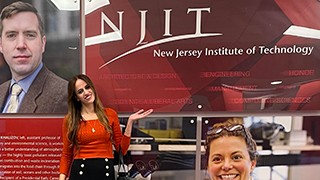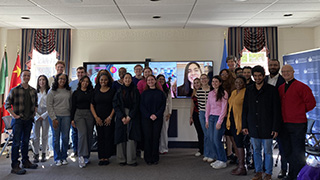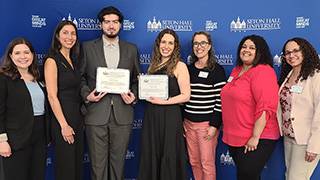Inside the Core: We Look Forward to a Talk by Martha Hennessy
Friday, November 1, 2024

Martha Hennessy with her grandmother, Dorothy Day
Inside the Core this week, we are excitedly anticipating a talk by Martha Hennessy, Dorothy Day’s granddaughter, on Wednesday, Nov. 6 at 2 p.m. in the Chancellor’s Suite in the Student Center. The event will also be available on TEAMS. The Catholic Studies Program, which is co-sponsoring the event with the Core, posted a wonderful piece on the event, giving details. Here is the link to that posting from September.
This week’s Inside the Core is a reminder to attend. The talk will be on the day after our presidential election. Dorothy Day was a person for whom political discourse and faith were intimately connected. Never afraid of controversy, she applied Gospel principles to the whole of life. In the Core, we read either Loaves and Fishes or The Long Loneliness. The former focuses on the Catholic Worker, particularly the establishment of the Houses of Hospitality, still in existence, all over the country. The Catholic Worker newspaper, started by Dorothy Day and Peter Maurin, still circulates at the consistent rate of one penny a copy, so literally anyone can buy it. The Long Loneliness is more of a personal autobiography. Dorothy Day converted to Catholicism as an adult, and this led to the break-up of her relationship with her partner, Forster Battenham, the father of her daughter Tamar and, of course, the grandfather of Martha Hennessy. For the rest of her life Dorothy lived a certain loneliness, though she also had deep and powerful relationships with the many people whose lives she touched. The Long Loneliness and Loaves and Fishes give beautiful details about these many priceless relationships, including with her family members.
Dorothy Day is on the road to canonization. She is officially called Servant of God, but the process for moving her toward sainthood is in process. She once famously said, “Don’t call me a saint…,” which sounds like an expression of humility (and Dorothy Day was a humble woman), but the completion of the sentence gives the actual intent of her particular thought in this case – “I don’t want to be dismissed that easily.” She feared that by labelling her a saint, the rest of us could feel “off the hook,” since we are not “saints” so we would not have to go the extra mile for social justice, helping the poor, and advocating for peace that Dorothy did. Dorothy would say we are all called to be saints, and when we hear her granddaughter talk about this “modern day prophet,” let’s be ready to be inspired.
Categories: Faith and Service





